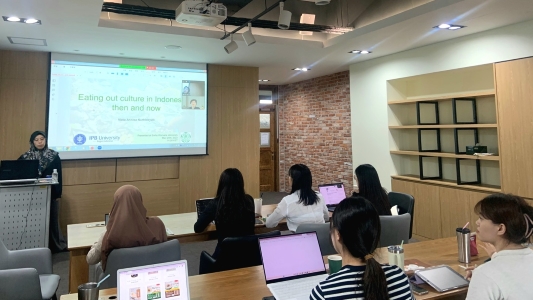A Lecturer from IPB University’s Vocational School becomes a Guest Lecturer at Ewha Womans University, Korea

A Lecturer from IPB University’s Vocational School becomes a Guest Lecturer at Ewha Womans University, Korea
A lecturer at IPB University’s Vocational School in the Food and Nutrition Service Management (MIJMG) Program, Vieta Annisa Nurhidayati, SGz, MSc delivered a guest lecture at the Department of Nutritional Science and Food Management, Ewha Womans University, Republic of Korea.
The guest lecture, titled “Eating out culture in Indonesia: then and now,” was conducted in person at the Human Ecology Building (Morris Hall) some time ago. The event was opened by Associate Professor Sunhee Seo, a professor specializing in food service management at Ewha Womans University.
The activity was part of a special lecture in the field of food service management. As per her field of expertise, the lecture was attended by nine undergraduate students specializing in the Food Service Industry Track and five graduate students under the Food Service Management Research Laboratory.
“Eating out culture, or the culture of dining outside the home, is not only done to fulfill food needs but also as recreation and social expression,” explained Vieta Annisa Nurhidayati, citing the research of Warde A and Martens L.
She elaborated that dining out for Indonesian society is often used as an agenda to strengthen family and community relationships during various celebrations and important events. In West Java itself, there are many activities such as botram, cucurak, and arisan, which are cultural dining practices conducted by various communities to strengthen social ties.
“At the family level, dining out is commonly done on important days such as family birthdays or weekends as a form of recreation. This indicates the high frequency of dining out in Indonesian society,” she expressed.
She mentioned that Korean food, or K-food, is currently popular among many Indonesians. This is evident from various Korean food trends observed over the past few years, such as garlic cheese bread and dalgona coffee. Not to mention the various foods introduced through Korean dramas or “drakor” such as tteokbokki, buldak chicken, and odeng. Therefore, the Korean food industry holds great potential for development in Indonesia.
During the meeting, she also introduced the concept of halal to the lecture participants. “The majority of Indonesian consumers are Muslims who consume halal food, so this needs to be taken into account by Korean food industry producers who plan to expand their businesses in Indonesia,” she added. (* / Rz) (IAAS/DSR)


